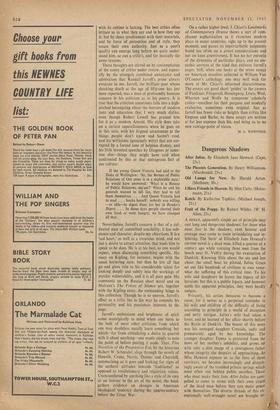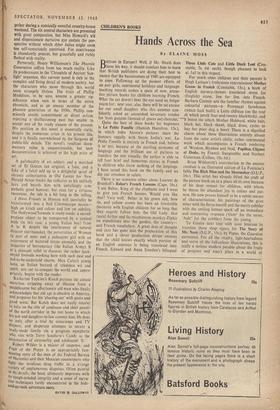Dangerous Shadows
The Phoenix Generation. By Henry Williamson. (Macdonald, 25s.) Old Lamps for New. By Harold Acton. (Methuen, 30s.) Fruit of the Poppy. By Robert Wilder. (W. H. Allen, 25s.) A SINGLE, apparently simple act of principle may cast long and dangerous shadows; for those who must live in the shadows, even honour and courage may come to seem intimidating and in- hibiting. The `hero' of Elizabeth Jane Howard's current novel is a dead man, killed a quarter of a century ago while rescuing three men from the beach near St. Valery during the evacuation of Dunkirk. Knowing little about the sea and less about the small boat he piloted, Julius, Grace set out like hundreds of civilians to ease some- what the suffering of this critical time. To his wife and daughters he leaves the legacy of his heroism; but this is a public legacy, and however noble his apparent principles, they were hardly unique.
Privately, his action threatens to become a curse, for it serves as a perpetual reminder to his wife and children of the difficulty of living according to principle in a world of deception and petty intrigue. Julius's wife had taken a lover, and he learned of her affair shortly before the Battle of Dunkirk. The bearer of this news was his teenaged daughter Cressida, sadly and prematurely aged by her knowledge. The younger daughter Emma is protected from the news of her mother's infidelity, and grows up with only a dim image of a courageous father whose integrity she despairs of approaching. As Miss Howard exposes us to the lives of these survivors, we become increasingly and disturb- ingly aware of the troubled private springs which must often rest behind public sacrifice. Those
who must make their lives After Julius are com-
pelled to come to terms with their own vision of the dead man before they can make •peace with themselves. The diverse threads of this ex- ceptionally well-wrought novel are brought to- gether during a comically eventful country-house weekend. The six central characters are presented with great compassion, but Miss Howard's wit and dispassionate narrative eye sustain the per- spective without which After Julius might seem too self-consciously contrived. For contrivance is abundantly present, but gracefully and richly fleshed with reality.
Perversely, Henry Williamson's The Phoenix Generation suffers from too much reality. Like
iltvits predecessors in the 'Chronicle of Ancient Sun- light' sequence, this current novel is rich in the complex and living detail of modern society, but the characters who move through this world
seem strangely lifeless. The trials of Phillip Maddison, to be sure, assume a greater sig- nificance when seen in terms of the entire chronicle, and as an uneasy member of the phoenix generation of the 1930s. Phillip con- sciously avoids commitment or direct action, rejecting a disillusioning past but unable to accept any of the ready stances of the present. His position in this novel is essentially static, 'despite the numerous crises in his private life, and it is finally overwhelmed by the Sargasso of public-life details. The novel's resultant docu- mentary value is unquestionable, but here documentation is achieved at the high price of art.
A gallimaufry Of art addicts and a matched set of El Grecos (an original, a fake, and a fake of a fake) add up to a delightful spoof of chronic collectionitis in 'Old Lamps for New. Harold Acton tracks the collector to his unlikely lairs and beards him with unfailingly sym- pathetic good humour, but even for a virtuoso raconteur, the tale is a bit long in the telling.
I Have Friends in Heaven will inevitably be transformed into a bad Cinemascope movie— high on kitsch and colour and low on subtlety. The Hollywood formula is ready-made: a sacred- profane object to be transported by a cynical male (in this case, a young Italian boy) from A to B, despite the interference of natural disaster (earthquake), the perversities of Woman (a pair of nuns and a pubescent girl with an assortment of battered circus animals), and the iniquities of bureaucracy (the Italian Army). It is a pleasant relief to discover the rather hack- neyed formula working here with such ease and not-to-be-undersold charm. Max Catto's young hero, an Italian bastard of relentless wit and spirit, sets out to conquer the world and, appro- priately, begins with the reader.
Katherine Topkins's Kotch pictures the almost , merciless stripping away of illusion from a
meddlesome but affectionate old man who finally acknowledges that old age is obsolete in America, and prepares for his 'phasing-out' with gusto and good sense. But Kotch does not easily resolve to take on the role of confessor and chief pundit of the north corridor in the rest home to which his son and daughter-in-law commit him. He does so only after a trial by conscience and TV dinners, and desperate attempts to secure a ready-made family via a pregnant nymphette who vies with Terry Southern's Candy as the
incarnation of externality 'It.'
. and adolescent 'I
Robert Wilder is a master of suspense, and Fruit of the. Poppy is an appropriately fast- moving story of the men df the Federal Bureau of Narcotics and their Mexican counterparts who fight the insidious drug traffic in a strange variety of unglamorous disguises. Often painful in its details, the book ultimately impresses with its tough-minded integrity and a sense of narra- tive techniques rarely encountered in the hide- and-go-seek adventure story.
DAVID D. GALLOWAY















































 Previous page
Previous page